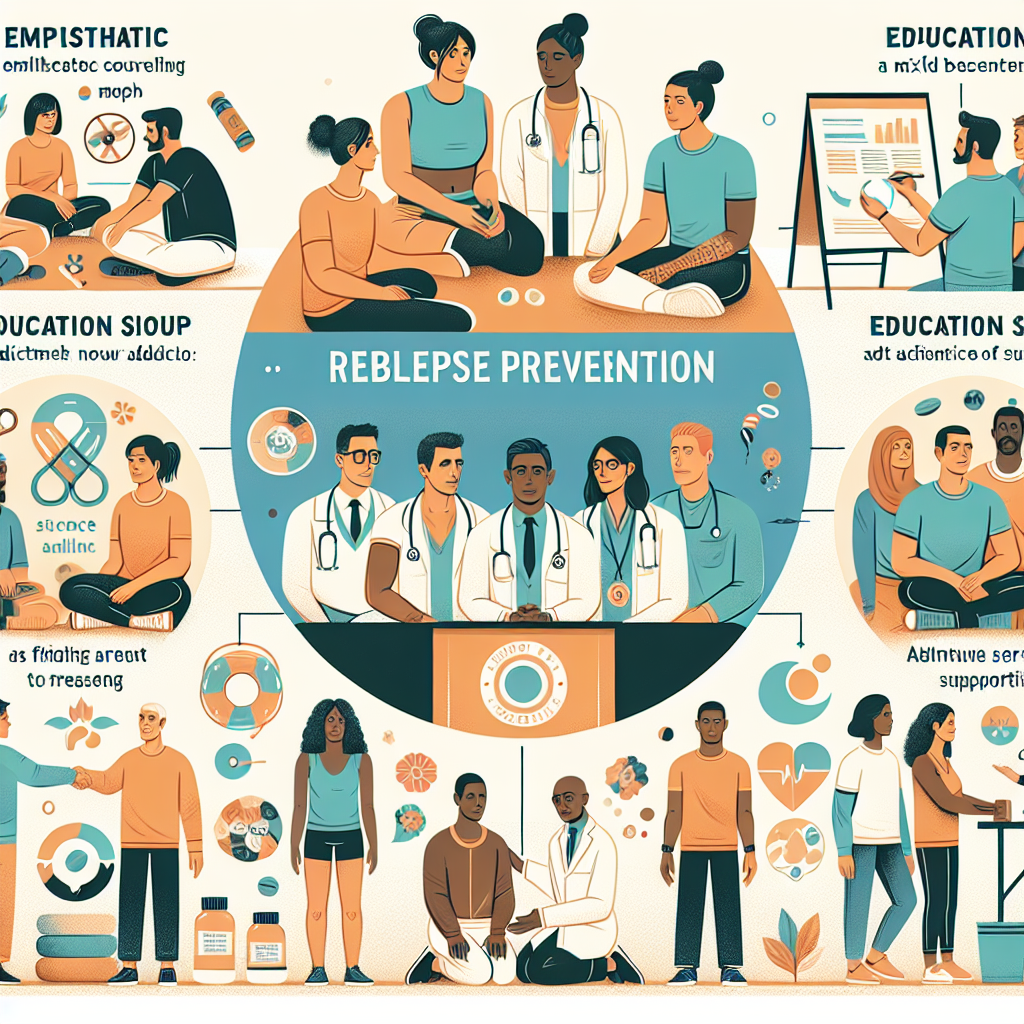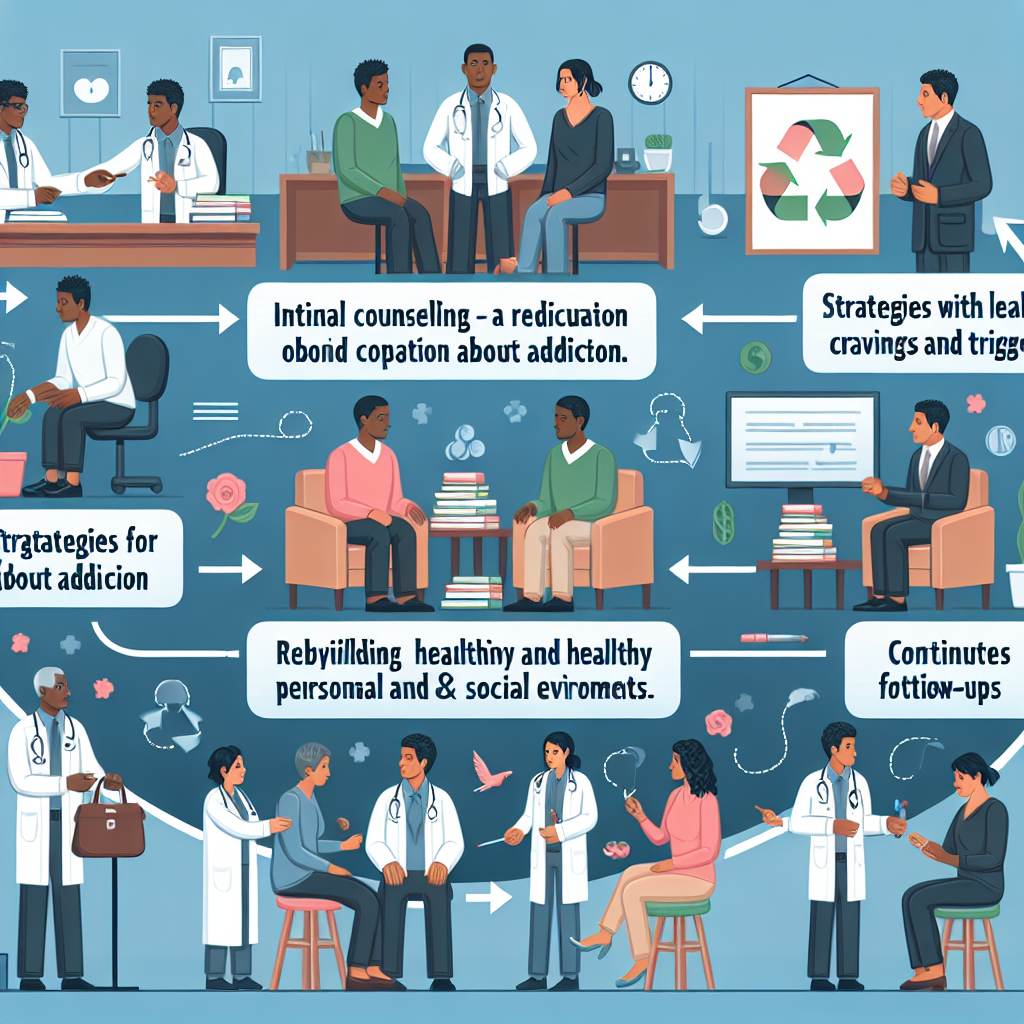-
Table of Contents

“Empowering Resilience: Comprehensive Support for Lasting Recovery”
Introduction
Addiction recovery services address relapse prevention through a multifaceted approach that includes individualized treatment plans, continuous support, and education. These services often incorporate evidence-based therapies such as cognitive-behavioral therapy (CBT) to help individuals identify and manage triggers, stressors, and high-risk situations that may lead to relapse. Additionally, recovery programs emphasize the importance of building a strong support network, which can include family, friends, and support groups like Alcoholics Anonymous (AA) or Narcotics Anonymous (NA). Regular follow-up sessions, aftercare programs, and access to resources such as counseling and medication-assisted treatment (MAT) are also critical components. By providing comprehensive care and ongoing support, addiction recovery services aim to equip individuals with the tools and strategies necessary to maintain long-term sobriety and prevent relapse.
Strategies Employed by Addiction Recovery Services to Prevent Relapse
Addiction recovery services employ a multifaceted approach to prevent relapse, recognizing that recovery is a continuous journey rather than a one-time event. One of the primary strategies involves comprehensive education about addiction and its triggers. By understanding the nature of addiction, individuals can better recognize the signs of potential relapse and take proactive steps to address them. This educational component often includes information on the physiological and psychological aspects of addiction, helping individuals to grasp the complexities of their condition and the importance of ongoing vigilance.
In addition to education, addiction recovery services emphasize the development of coping skills. These skills are crucial for managing stress, which is a common trigger for relapse. Techniques such as mindfulness, meditation, and cognitive-behavioral therapy (CBT) are frequently taught to help individuals handle stress in a healthy manner. Mindfulness and meditation encourage individuals to stay present and grounded, reducing the likelihood of being overwhelmed by cravings or negative emotions. CBT, on the other hand, helps individuals to identify and change negative thought patterns that can lead to relapse.
Another key strategy is the creation of a strong support network. Recovery services often facilitate group therapy sessions where individuals can share their experiences and offer mutual support. These sessions foster a sense of community and belonging, which can be incredibly empowering. Knowing that they are not alone in their struggles can provide individuals with the strength and motivation to stay on the path to recovery. Additionally, many recovery programs encourage the involvement of family and friends, educating them on how to provide effective support without enabling addictive behaviors.
Furthermore, addiction recovery services often incorporate aftercare programs to ensure long-term success. These programs may include regular check-ins with a counselor, ongoing therapy sessions, and participation in support groups such as Alcoholics Anonymous (AA) or Narcotics Anonymous (NA). Aftercare programs are designed to provide continuous support and accountability, which are essential for maintaining sobriety. They also offer a safety net for individuals who may be struggling, providing immediate access to resources and support when needed.
Moreover, lifestyle changes are strongly encouraged as part of the relapse prevention strategy. This can include adopting a healthy diet, engaging in regular physical activity, and establishing a stable daily routine. These changes not only improve physical health but also contribute to mental well-being, making it easier to resist the temptation to relapse. Engaging in new hobbies and activities can also provide a sense of purpose and fulfillment, reducing the desire to return to old habits.
Lastly, addiction recovery services often address co-occurring mental health issues, which can be a significant factor in relapse. By providing integrated treatment for conditions such as depression, anxiety, or PTSD, recovery programs ensure that individuals receive comprehensive care. Treating these underlying issues can significantly reduce the risk of relapse, as individuals are better equipped to manage their mental health without resorting to substance use.
In conclusion, addiction recovery services employ a holistic approach to relapse prevention, combining education, coping skills, support networks, aftercare programs, lifestyle changes, and integrated mental health treatment. This multifaceted strategy not only addresses the immediate challenges of addiction but also equips individuals with the tools and support they need for long-term success. Through these efforts, recovery services inspire hope and empower individuals to reclaim their lives, one step at a time.
The Role of Counseling and Support Groups in Relapse Prevention
Addiction recovery is a journey that requires a multifaceted approach, and one of the most critical aspects of this journey is relapse prevention. Counseling and support groups play a pivotal role in this process, offering individuals the tools and community they need to maintain their sobriety. These services are designed to address the underlying issues that contribute to addiction, provide emotional support, and equip individuals with strategies to handle triggers and stressors.
Counseling, whether individual or group-based, serves as a cornerstone in relapse prevention. Through counseling, individuals can explore the root causes of their addiction, such as trauma, mental health issues, or environmental factors. By understanding these underlying issues, individuals can develop healthier coping mechanisms. Counselors work with clients to identify triggers and create personalized relapse prevention plans. These plans often include strategies for managing cravings, dealing with high-risk situations, and maintaining a balanced lifestyle. Cognitive-behavioral therapy (CBT) is particularly effective in this regard, as it helps individuals reframe negative thought patterns and develop positive behaviors.
In addition to individual counseling, support groups offer a sense of community and shared experience that is invaluable in relapse prevention. Groups like Alcoholics Anonymous (AA) or Narcotics Anonymous (NA) provide a platform for individuals to share their struggles and successes with others who understand their journey. This sense of belonging can be incredibly empowering, as it reduces feelings of isolation and provides a network of support. Members of these groups often form strong bonds, offering each other encouragement and accountability. The shared experiences and collective wisdom of the group can provide practical advice and emotional support that is crucial for long-term recovery.
Moreover, support groups often incorporate elements of mentorship, where more experienced members guide newcomers through the early stages of recovery. This mentorship can be a lifeline, offering practical advice and emotional support. The structure of these groups, with regular meetings and a focus on personal responsibility, helps individuals stay committed to their recovery goals. The 12-step programs, which are a hallmark of many support groups, provide a structured approach to recovery that emphasizes personal growth, accountability, and spiritual development.
Another essential aspect of counseling and support groups in relapse prevention is the focus on building a balanced and fulfilling life. Recovery is not just about abstaining from substances; it’s about creating a life that is rich and meaningful. Counselors and support groups encourage individuals to pursue hobbies, build healthy relationships, and set personal and professional goals. By fostering a sense of purpose and fulfillment, these services help individuals build a life that is incompatible with addiction.
Furthermore, both counseling and support groups emphasize the importance of self-care and stress management. Techniques such as mindfulness, meditation, and exercise are often incorporated into relapse prevention plans. These practices help individuals manage stress and emotional turmoil, which are common triggers for relapse. By learning to care for their mental and physical well-being, individuals are better equipped to handle the challenges of recovery.
In conclusion, counseling and support groups are integral to relapse prevention in addiction recovery. They provide the tools, support, and community that individuals need to maintain their sobriety. Through understanding the root causes of addiction, developing coping strategies, building a supportive network, and fostering a balanced life, these services empower individuals to stay on the path of recovery. The journey may be challenging, but with the right support, it is entirely possible to achieve lasting sobriety and a fulfilling life.
Q&A
1. **Question:** What strategies do addiction recovery services use to prevent relapse?
**Answer:** Addiction recovery services often use cognitive-behavioral therapy (CBT), contingency management, and motivational interviewing to help individuals recognize and cope with triggers, develop healthy coping mechanisms, and maintain motivation for sobriety.
2. **Question:** How do support groups contribute to relapse prevention in addiction recovery?
**Answer:** Support groups, such as Alcoholics Anonymous (AA) or Narcotics Anonymous (NA), provide a community of peers who share experiences and offer mutual support, which helps individuals stay accountable and motivated to maintain their recovery and prevent relapse.
Conclusion
Addiction recovery services address relapse prevention through a multifaceted approach that includes individualized treatment plans, behavioral therapies, support groups, and ongoing monitoring. These services often incorporate cognitive-behavioral therapy (CBT) to help individuals recognize and manage triggers, stress management techniques to cope with daily challenges, and medication-assisted treatment (MAT) when appropriate. Additionally, recovery programs emphasize the importance of building a strong support network, including family, friends, and peer support groups like Alcoholics Anonymous (AA) or Narcotics Anonymous (NA). Continuous education and relapse prevention planning are integral, equipping individuals with strategies to maintain sobriety and handle potential setbacks effectively.



